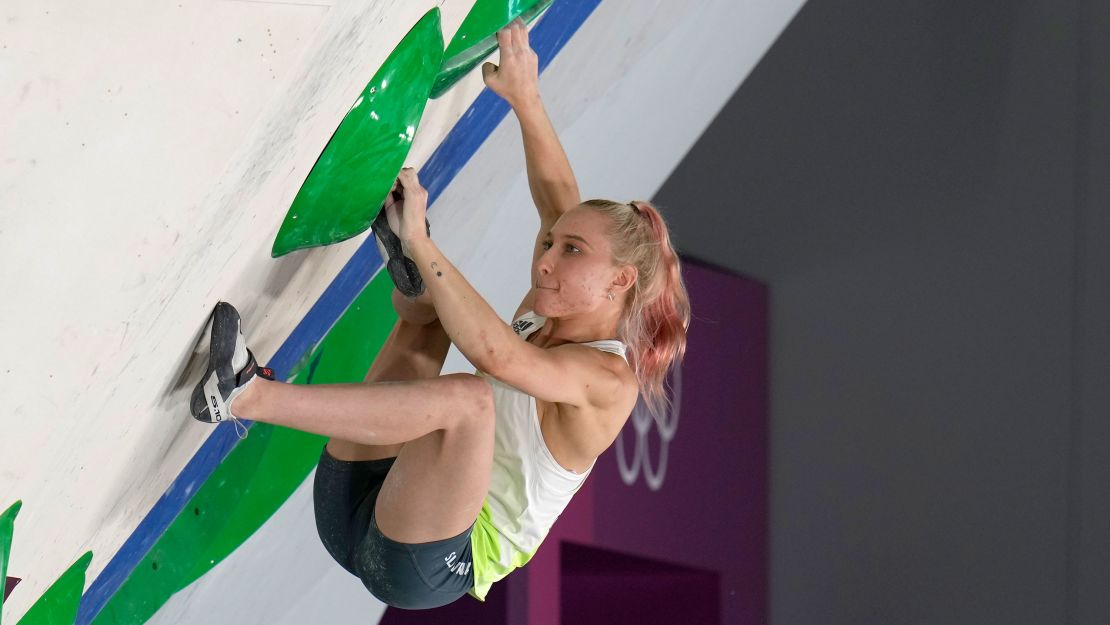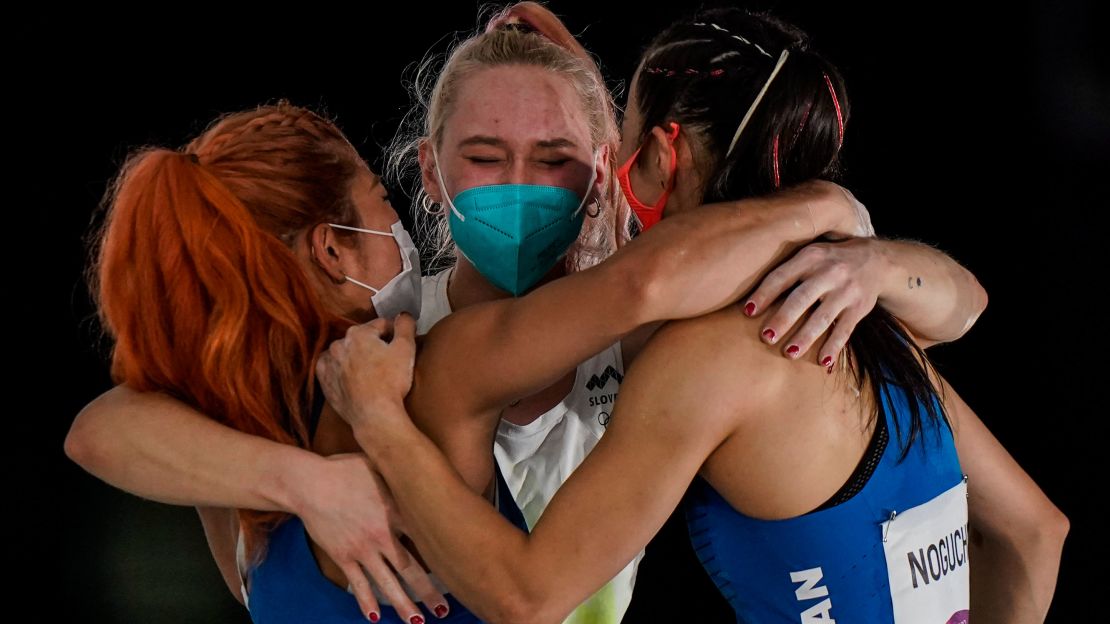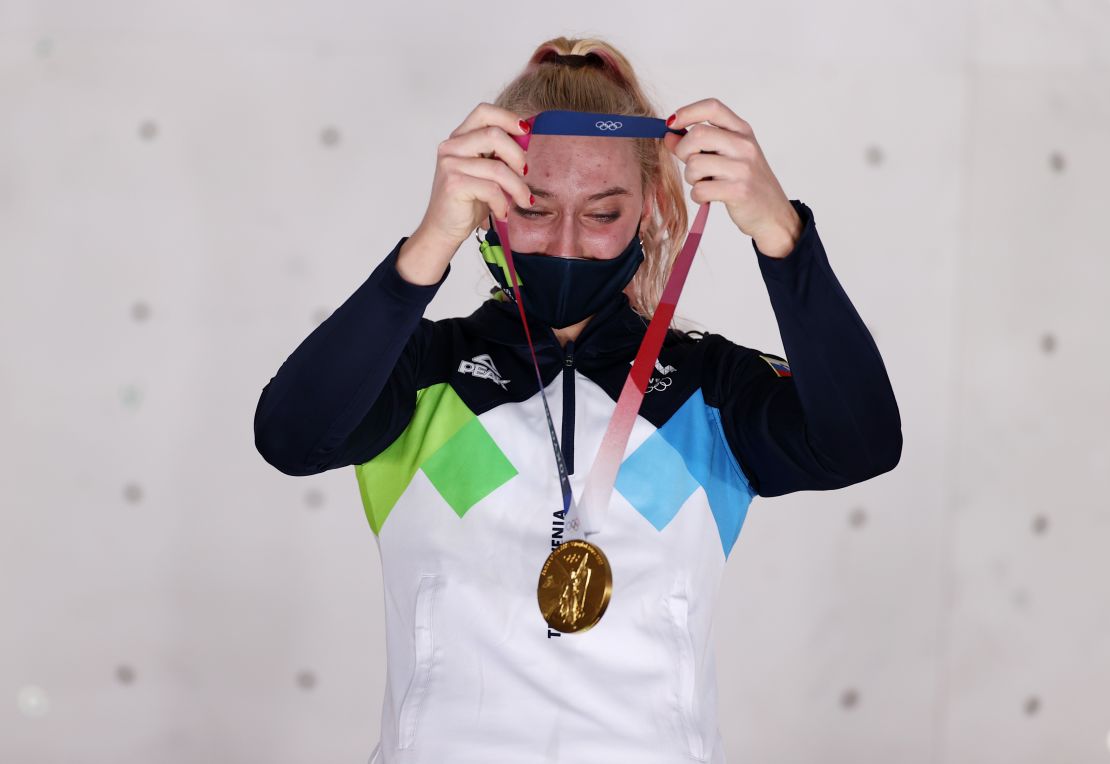As night descended on Tokyo, the climbing wall at the Aomi Urban Sports Park was bathed in light.
It was there that Janja Garnbret became the first woman to win a gold medal in sport climbing at the Olympics, thanks largely to masterful bouldering and lead performances.
Garnbret, widely considered the favorite ahead of the women’s combined final, completed two of the three bouldering “problems,” while none of the other climbers managed to solve one.
She then climbed higher than her competitors on the lead wall to wrap up the victory and become the first Slovenian woman to win a gold medal at the Tokyo Olympics.
The 22-year-old Garnbret finished with five points, well clear of the Japanese duo of Miho Nonaka in silver on 45 points and Akiyo Noguchi, who is retiring after the Olympics, in bronze on 64 points.

Those three climbers faced a nervous wait before the results were confirmed at the end of the lead discipline. When her victory was official, a visibly emotional Garnbret put her head in her hands before embracing Slovenia’s coaching team.
“This was the hardest competition in my entire career … I felt like the whole pressure is on me, that the whole world has decided that I’ll win the gold medal,” Garnbret told reporters.
“It’s not like that. It’s a combination (of scores), anything can happen because all the girls in the finals are super strong. You can’t just say that you will win a gold medal. It was definitely super hard, especially mentally hard.”
READ: 13-year-old bronze medalist Sky Brown on empowering a new generation of skateboarders
Speed world record
The dark clouds that spread across Tokyo’s skyline made for a dramatic backdrop against the bright lights of the climbing wall, a temporary structure erected for the Olympics.
Spectators are unable to attend Olympic events in Tokyo with the city under a coronavirus state of emergency, but that didn’t stop members of the public from trying to catch a glimpse of the climbing action from a nearby street – even with the presence of security officials and signs advising otherwise.
For many, this will be the closest they come to the Tokyo Olympics. Those inside the venue included competitors from Thursday’s men’s combined final and many off-duty volunteers who cheered on eventual medalists Noguchi and Nonaka.

The final, which followed Alberto Ginés’ gold medal for Spain in the men’s combined, tackled three disciplines: speed, bouldering and lead. The climbers’ standings in each discipline were then multiplied together, with the winner being the athlete with the lowest score.
The speed component, which sees climbers compete in head-to-head races, was won by Poland’s Aleksandra Miroslaw in a blistering world record time of 6.84 seconds.
However, Miroslaw, a speed specialist, saw her medal chances dented with eighth-place finishes in bouldering and lead.
Garnbret placed fifth in speed, her weakest discipline, setting a personal best of 7.81 seconds in the process, before showing her class in bouldering and lead to take an emphatic victory by 40 points.

Nonaka and Noguchi both scored consistently across the board to round off the medal positions. It was the fourth time in the Tokyo Olympics that Japan has won multiple medals in a single event.
“We have been leading sports climbing in Japan,” Noguchi told reporters.
“There were only two slots for Japanese athletes and both of us were able to get the medals and I’m very happy about that.”
The close of the women’s combined final saw climbing’s Olympic debut in Tokyo come to an end.
Added to the program to attract younger audiences, climbers across the four days of competition showcased their skills against the backdrop of loud music and animated support from stadium announcers.





![Gold medallist Oksana Masters of the US celebrates on the podium after competing in the women's cycling road individual H4-5 time trial during the Tokyo 2020 Paralympic Games at the Fuji International Speedway in Oyama on August 31, 2021. (Photo by CHARLY TRIBALLEAU / AFP) / The erroneous mention[s] appearing in the metadata of this photo by CHARLY TRIBALLEAU has been modified in AFP systems in the following manner: [August 31] instead of [August 30]. Please immediately remove the erroneous mention[s] from all your online services and delete it (them) from your servers. If you have been authorized by AFP to distribute it (them) to third parties, please ensure that the same actions are carried out by them. Failure to promptly comply with these instructions will entail liability on your part for any continued or post notification usage. Therefore we thank you very much for all your attention and prompt action. We are sorry for the inconvenience this notification may cause and remain at your disposal for any further information you may require. (Photo by CHARLY TRIBALLEAU/AFP via Getty Images)](https://media.cnn.com/api/v1/images/stellar/prod/210903163129-oksana-masters-video-tease.jpg?q=x_85,y_8,h_2190,w_3891,c_crop/w_250)















